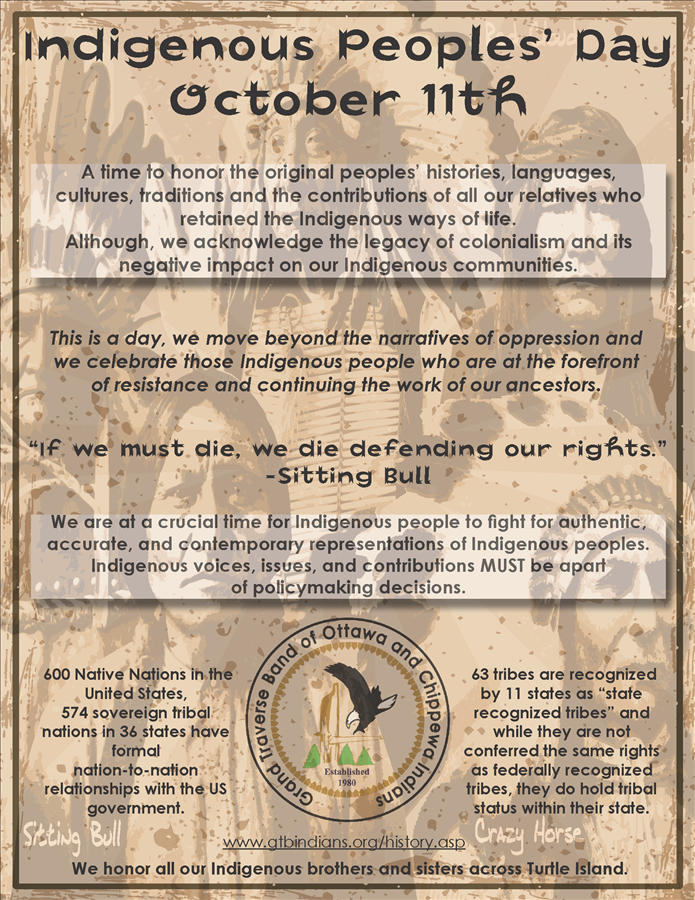Home / Our History
We are the Anishinaabek
We are the people of the Three Fires Confederacy, the Odawa (Ottawa) the Ojibwa (Chippewa) and Bodowadomi (Pottawatomi) people. Our oral history traces us back to the Eastern Coast of Turtle Island where our spiritual leaders told us that we should travel to the west until we found the food growing on the water. Our people traveled until we found wild rice growing on the water and we knew we were home.
We were traders and established trade routes as far east as the Atlantic Ocean, as far west as the Rocky Mountains, as far North as Northern Canada, and as far South as the Gulf of Mexico. We were a wealthy nation respected by all our neighboring Nations. When the French arrived in our land we established trade with them and when the English came to our land they also sought us out as trading partners.
A great war broke out between France and England on our lands and the right to trade with our nation. Some of the people remained neutral in the war and some of the people sided with the French and fought against the Native Nations who sided with the English. The English won the war and the French moved north. The people continued to trade with the French to the north as well as the English on our lands.
A second war occurred on our lands when the Americans fought the English. When the war ended our people found a new government interested in our lands. This new United States government brought us a treaty to sign in 1836, and in 1837 the State of Michigan was established from lands ceded in this treaty. Two thirds of the land that is now the State of Michigan was ceded in that treaty. The people reserved lands for their own use and the use of the ceded lands. The people reserved their hunting, fishing, and gathering rights in this Treaty.
In 1855 the United States government brought another treaty to our people and asked that the remaining third of what is now Michigan be ceded to the United States Government. When this treaty was signed a reserve was established that included most of Leelanau County and a large tract of land in Antrim County. Almost all of this land was illegally taken from the people and had to be re-purchased.
The two treaties with the people were broken many times by the federal government. Services promised were not received and the people went without any federal or state assistance from a time period shortly after the treaty of 1855 until 1980 as the Bureau of Indian Affairs determined incorrectly that the Tribe had been terminated by signing the treaty. The Tribe applied for federal recognition under the Indian Reorganization Act under the leadership of Ben Peshaba in 1934. The Tribe was denied. The Tribe applied for federal recognition in 1943 under the leadership of Casper Ance. The Tribe was denied. The Tribe applied for federal recognition in 1978 under the leadership of Dodie Harris Chambers. On May 27, 1980 the Tribe was re-recognized by the federal government as the Grand Traverse Band of Ottawa and Chippewa Indians. The Tribe drafted a Constitution and formed a government.
Under the Indian Reorganization Act The Tribe developed Tribal programs to serve the membership and in 1983 established an Economic Development Corporation and began to establish businesses for the Tribe. The Tribe has been very successful in business and today is able to provide many forms of assistance to the members of the Tribe. The Tribe, in the tradition of the people, honors our elders and gives respect and encouragement to our youth for they are our future.
Niinwe Anishinaabek Ndaawmi
Niinwe nswi shkwaadeng ndijibaami, Odawak, Ojibwek miinawa Bodwe'aadamiik. Waabinong nikeyaa giiyenh ngiibijebaami maanpii mshiikenh minising. Gwanda dash emanidoo'aadizijik epangishmok nikeyaa giiyenh gaazhaami giikidwok piinish ode miijim zaakiik gidji nbiing. Mii saa giimkaamaang we minomin zaakiik, mii saa giidwaashinaang endaayaang.
Ngiintaameshtoongemi kina gwaaji gaapaazhizhaayaang Waabinong, Epangishmok, Kiiwedinong miinawa Zhaawanong nikeyaa. Ngiimnadenmigoominaanik kina gwayaa. Piich dash gwanda Wemtigoshok dekwshinwat maanpii ngiimeshtoonmowaanaanik gewiinwa miinawa gwa gewe Zhaaganaashak. Giimiigaadiwok dash gewe Wemtigoshok miinawa Zhaaganaashak. Kaawiin aanin giimiigaasiiwok, aanin dash wiigwa Wemtigoshiin giinaadamowaawaan miinawa aanin Zhaaganaashiin giinaadamowaawaan. Zhaaganaashak dash giipkinaawewok, Kiiwedinong nikeyaa giizhaawok gewe Wemtigoshok. Giiyaabi dash wiigwa kina gwayaa giimeshtoongewok.
Mii dash gwa miinawa giimiigaading, Kchimookamaanak miinawa Zhaaganaashak. Piich dash gaashkwaamiigaading gwaanda naagaanzijik kchigemaa gamgong eyaajik, mzinigan giizhibiiyaanawaa maanda aki nji wiisigoyaang maanpii akiing. Ademnik dash wiigwa ngiimiinigoomi ntam. Ngiigewsemi, ngiigiigonhkemi pane gwa gaabinaankiiyaang ngiinaankiimi.
Giiyaabi dash miinawa bezhik mzinigan giizhichigaade mii dash kina kega giinaachtooyaang waadaayaang. Aapidji gwa baangii aki ngiishkwaanmaagomi. Niibinaa nching gii'aandakwaanigewok gewe kchimookmaani gemaak. Kaawiin giizhichigesiiwok gaakidwat.
Mii dash pama wiikaa giinikendaagwok gegeti gwa giiyaabi anishinaabek ndaawmi. Mii dash miinawa giizhibiigeyaang maaba Ben Peshaba pii giigemaawit, kaawiin giizhaabsesno. Mii gwa miinawa gwating maaba Caspen Ance giigemaawit, kaawiin miinawa giizhaabsesno. Mii gwa miinawa gwating maaba Dodi Haris Chamber giigemaawit. Mii saa we pii giinsidwenaagoyaang gegpii. Niin ntamwe dash mziniganan ngiizhibiiyaanaanin. Niinwe dash ndogemaami maanpii nangwaa. Naadamaadimi kina gekaajik miinawa eshkiniigejik.

